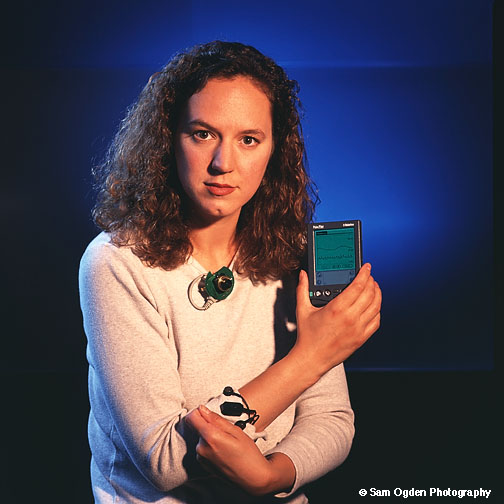Sensible Computers: Technologies that Enable Computers to Understand Human Emotion
 Jennifer Healey, MIT
Media Lab
Jennifer Healey, MIT
Media Lab
fenn@media.mit.edu
Seminar on People, Computers,
and Design
Stanford University October 27, 2000
There is a movement in computer science toward developing systems that learn what their users want and that try to model their user's interests and respond in a more adaptive way. Currently, methods of modeling user preferences and frustrations involve active non-social interactions, such as clicking on menus and creating preference lists; however, the natural way people communicate and respond to satisfaction or dissatisfaction is through affective expression.
To appear socially intelligent, computers will have to develop a model of their user's emotional state and respond to that state appropriately. This affective intelligence becomes more important as computers become more ubiquitous. A natural, social interaction with a spreadsheet or programming task might seem superfluous, but computers will soon be everywhere, in our homes, assisting with cooking, heating, and room ambiance, in our cars, controlling communication, navigation and music selection and even in our clothing, extending our senses, jogging our memories in appropriate contexts and perhaps broadcasting messages expressing our personality.
This talk will present novel systems for detecting emotional state through physiological signals using wearable computers and embedded systems with bio-sensors and cameras. These systems were used in three experiments to detect emotion in an office environment, an ambulatory environment and while driving a car. Recognition results by the computer are comparable to those found by a humans in similar experiments.
Jennifer Healey is a recent PhD graduate from MIT's Electrical Engineering and Computer Science department and conducted her thesis research at the MIT Media Lab where she was Pr. Rosalind Picard's first graduate student in the new field of Affective Computing. This summer she completed a post-doctoral position on a ubiquitous AI project at IBM's Zurich Research Laboratory. Her prior work includes a BS (1993) and MS (1995) from MIT in Electrical Engineering and Optics. She has been actively involved in the Media Lab's Wearables project and is interested in the applying bio-metric technologies for promoting health awareness and managing diseases related to chronic pain and stress. Her publications can be accessed through her media lab homepage at http://www.media.mit.edu/~fenn
View this talk on line at Stanford Online
Titles and abstracts for all years are available by year and by speaker.
For more information about HCI at Stanford see